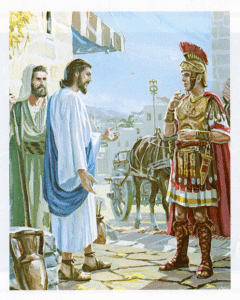The Centurion’s Example (Sermon on the 4th Sunday after Pentecost)
In the name of the Father and the Son and the Holy Spirit!
Dear brothers and sisters:
In today’s Gospel reading we heard about the Roman officer – centurion, who comes to Jesus and tells Him that his servant is diseased: «Lord! My servant is home lying in bed, he is weak and suffering”. These words sound as if the centurion himself is suffering. He does not even ask Christ to heal his servant. He simply comes to the Lord with complete trust, and tells Him about his servant’s affliction. As a military man, he knows from experience what to say to the Lord about his sorrow, about the illness; just as if he were reporting to his superior about a critical situation on the battle field. He believes that, based on his report, Christ will make the only possible and right decision and instantly render the necessary help: “I will come and heal him”, – the Lord answers immediately.
This centurion is an example of a person, who acts, according to the most important law of spiritual life, which we heard in the Gospel Reading on previous Sunday: “Seek first the Kingdom of God!” We see someone, who, through honest living by spiritual laws, becomes a saint. He is an officer of the Roman military machine and has enormous power over other people. But, from the point of view of unbelievers, he behaves rather strangely: instead of applying his worldly power and enjoying his superior position and his ability to order people around, he, on the first place, seeks the Kingdom of Heaven within himself, and then also for those, who belong to his household: relatives, as well as simple servants. He seeks the Kingdom of Love, and the King of that Kingdom is Jesus Christ! In order to find God’s Kingdom one must, firstly, love any person in trouble, and, secondly, show the compassion to the sufferer. The Kingdom of God on earth begins with distancing oneself from selfishness and putting all efforts into taking care about our close ones.
The centurion does not care for himself, but for his underlings, following one of the two main Christian laws: “Love thy neighbor as thyself”. He not only leads his subordinates, but serves them through teaching by his own example. It is almost as if the centurion traded work places with his domestics. He is “the servant of the Emperor and the father to the soldiers”. He has empathy for every person under his authority. How often in life, when given an important position at work, we undergo an inner change: we become rude, we demonstrate to everybody our significance, we merely stop noticing our co-workers, we talk down to everyone and believe that our behavior is normal? In these situations it is fundamental to remember the words of the Holy Scriptures about our relationship with others: “Treat others as you would like to be treated”. It is an imperative for a true Christian to behave towards others with love and respect. That is why the centurion spoke compassionately and asked nothing for himself, but did everything in his power to help another person. His story is an example of affability, respect and attention to one’s inferiors.
The Georgian elder Gabriel said that “God does not hear our prayers, unless they are preceded or accompanied by good deeds”. How often are we ready to pray, with our whole heart, for the complete strangers, sincerely asking the Lord to help? Sometimes a person calls himself a Christian, but does not realize the importance of praying for those who are not his or her close relatives. Sometimes we witness enmity at our work place, or ourselves become a part of a conflict and develop bad relations with our neighbors or co-workers. DO WE PRAY FOR THOSE PEOPLE?? How often our answer will be: “What for? They hurt me, persecuted me! I HATE THEM!” But the example of the centurion tells us that we must pray for all people, if we wish that the Lord grant us peace and reciprocal understanding with others.
A certain Greek priest had a very close friend, who fell ill with cancer. Not too long before his friend’s passing, the priest asked the elder Paisius from the Holy Mount Athos: “Тell me, does my prayer for my friend have any power?” The elder replied: “Yes, it has enormous power, but explain why you only pray for one person? Entreat for all people, implore for all the sick in the world. Prayer is like a bus: for the driver it is the same whether there is one or one hundred passengers inside… Learn to pray for all, who surround you, then you will resemble Jesus Christ and the Holy Theotokos!”
The centurion set a good example for us. The Roman officer from one of the best armies of that time, did not sit at home thinking: “If there is God, let Him heal my servant…”. He rather arose, left his home, inquired as to where the Christ was and addressed Him with heartfelt prayer. He made an effort, with faith, for the benefit of another person. He was seeking Christ, and was rewarded with what he had asked – the healing of his servant. More importantly, through this healing, the centurion became Christ like, he became a real believer. Amen!
St. Barbara’s Russian Orthodox Cathedral. June 28, 2015.




 Save as PDF
Save as PDF